CNA254 Client Report: CBT Intervention in Dementia Care - UTAS
VerifiedAdded on 2023/06/11
|7
|1866
|384
Report
AI Summary
This report examines the application of Cognitive Behavioral Therapy (CBT) in managing depression and anxiety in an 82-year-old dementia patient. It highlights the ineffectiveness of traditional anti-anxiety and antidepressant drugs, advocating for alternative treatments like CBT. The report reviews studies demonstrating CBT's effectiveness in reducing depressive symptoms and improving the quality of life for dementia patients. Modifications to CBT, such as slowing the therapy pace and simplifying communication, are discussed to address the specific needs of dementia patients. The report emphasizes the importance of nurses acquiring CBT skills to provide holistic and culturally sensitive care, ultimately improving patient outcomes in aged care settings. The case study of Mr. X, an 82-year-old dementia patient experiencing depression and agitation after his wife's death, serves as a practical example for applying CBT principles in nursing care.

Running head: NURSING
Evidence Based Nursing Research
Name of student:
Name of university:
Author note:
Evidence Based Nursing Research
Name of student:
Name of university:
Author note:
Paraphrase This Document
Need a fresh take? Get an instant paraphrase of this document with our AI Paraphraser
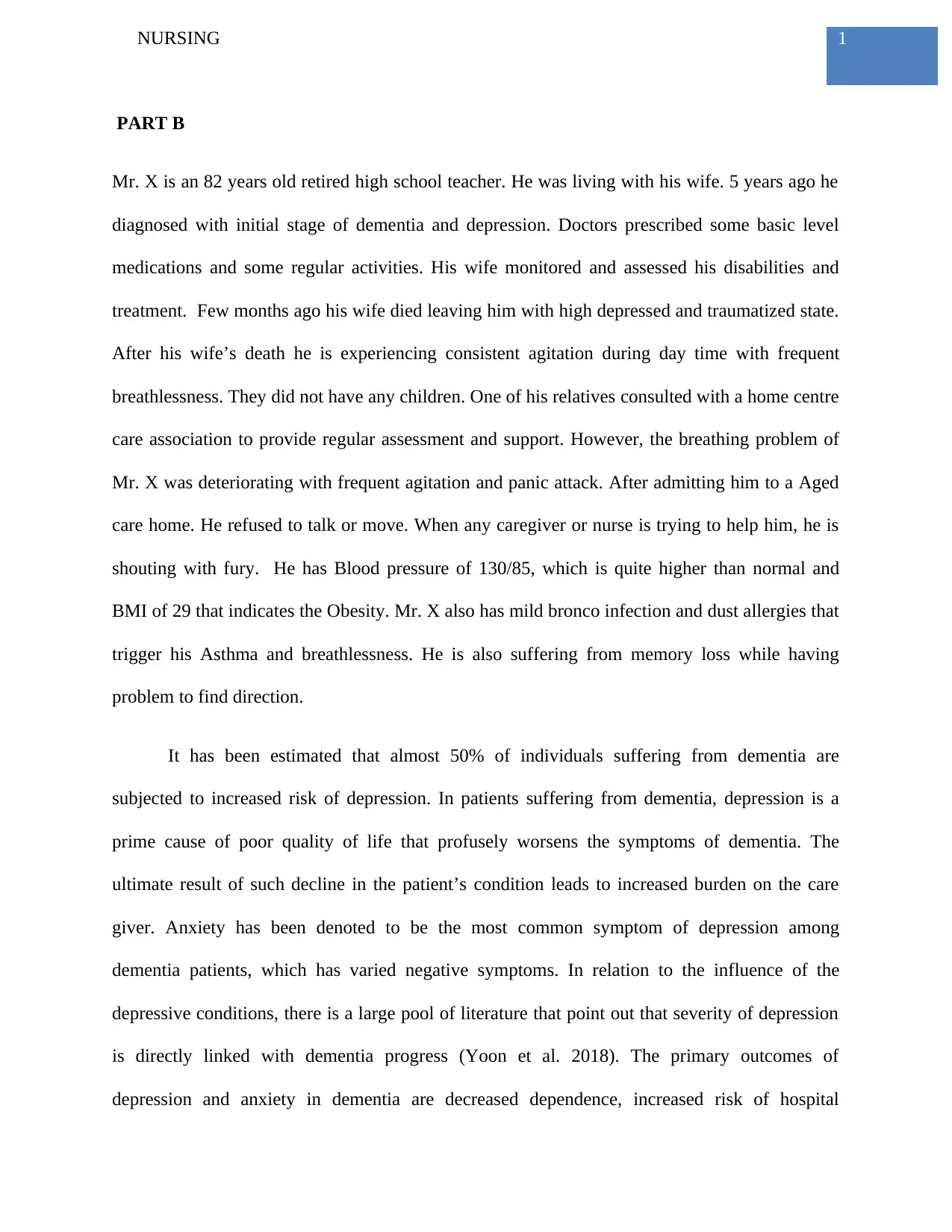
1NURSING
PART B
Mr. X is an 82 years old retired high school teacher. He was living with his wife. 5 years ago he
diagnosed with initial stage of dementia and depression. Doctors prescribed some basic level
medications and some regular activities. His wife monitored and assessed his disabilities and
treatment. Few months ago his wife died leaving him with high depressed and traumatized state.
After his wife’s death he is experiencing consistent agitation during day time with frequent
breathlessness. They did not have any children. One of his relatives consulted with a home centre
care association to provide regular assessment and support. However, the breathing problem of
Mr. X was deteriorating with frequent agitation and panic attack. After admitting him to a Aged
care home. He refused to talk or move. When any caregiver or nurse is trying to help him, he is
shouting with fury. He has Blood pressure of 130/85, which is quite higher than normal and
BMI of 29 that indicates the Obesity. Mr. X also has mild bronco infection and dust allergies that
trigger his Asthma and breathlessness. He is also suffering from memory loss while having
problem to find direction.
It has been estimated that almost 50% of individuals suffering from dementia are
subjected to increased risk of depression. In patients suffering from dementia, depression is a
prime cause of poor quality of life that profusely worsens the symptoms of dementia. The
ultimate result of such decline in the patient’s condition leads to increased burden on the care
giver. Anxiety has been denoted to be the most common symptom of depression among
dementia patients, which has varied negative symptoms. In relation to the influence of the
depressive conditions, there is a large pool of literature that point out that severity of depression
is directly linked with dementia progress (Yoon et al. 2018). The primary outcomes of
depression and anxiety in dementia are decreased dependence, increased risk of hospital
PART B
Mr. X is an 82 years old retired high school teacher. He was living with his wife. 5 years ago he
diagnosed with initial stage of dementia and depression. Doctors prescribed some basic level
medications and some regular activities. His wife monitored and assessed his disabilities and
treatment. Few months ago his wife died leaving him with high depressed and traumatized state.
After his wife’s death he is experiencing consistent agitation during day time with frequent
breathlessness. They did not have any children. One of his relatives consulted with a home centre
care association to provide regular assessment and support. However, the breathing problem of
Mr. X was deteriorating with frequent agitation and panic attack. After admitting him to a Aged
care home. He refused to talk or move. When any caregiver or nurse is trying to help him, he is
shouting with fury. He has Blood pressure of 130/85, which is quite higher than normal and
BMI of 29 that indicates the Obesity. Mr. X also has mild bronco infection and dust allergies that
trigger his Asthma and breathlessness. He is also suffering from memory loss while having
problem to find direction.
It has been estimated that almost 50% of individuals suffering from dementia are
subjected to increased risk of depression. In patients suffering from dementia, depression is a
prime cause of poor quality of life that profusely worsens the symptoms of dementia. The
ultimate result of such decline in the patient’s condition leads to increased burden on the care
giver. Anxiety has been denoted to be the most common symptom of depression among
dementia patients, which has varied negative symptoms. In relation to the influence of the
depressive conditions, there is a large pool of literature that point out that severity of depression
is directly linked with dementia progress (Yoon et al. 2018). The primary outcomes of
depression and anxiety in dementia are decreased dependence, increased risk of hospital
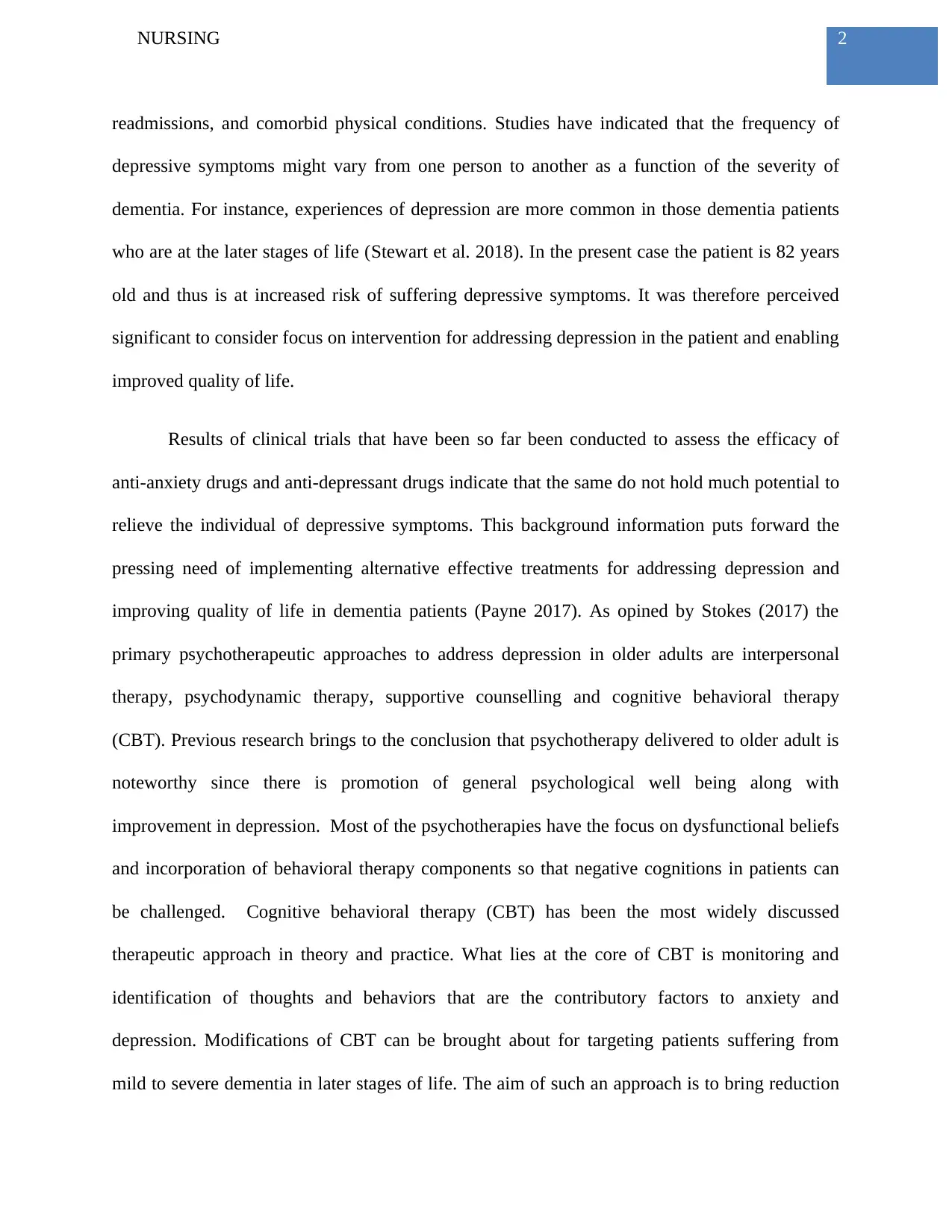
2NURSING
readmissions, and comorbid physical conditions. Studies have indicated that the frequency of
depressive symptoms might vary from one person to another as a function of the severity of
dementia. For instance, experiences of depression are more common in those dementia patients
who are at the later stages of life (Stewart et al. 2018). In the present case the patient is 82 years
old and thus is at increased risk of suffering depressive symptoms. It was therefore perceived
significant to consider focus on intervention for addressing depression in the patient and enabling
improved quality of life.
Results of clinical trials that have been so far been conducted to assess the efficacy of
anti-anxiety drugs and anti-depressant drugs indicate that the same do not hold much potential to
relieve the individual of depressive symptoms. This background information puts forward the
pressing need of implementing alternative effective treatments for addressing depression and
improving quality of life in dementia patients (Payne 2017). As opined by Stokes (2017) the
primary psychotherapeutic approaches to address depression in older adults are interpersonal
therapy, psychodynamic therapy, supportive counselling and cognitive behavioral therapy
(CBT). Previous research brings to the conclusion that psychotherapy delivered to older adult is
noteworthy since there is promotion of general psychological well being along with
improvement in depression. Most of the psychotherapies have the focus on dysfunctional beliefs
and incorporation of behavioral therapy components so that negative cognitions in patients can
be challenged. Cognitive behavioral therapy (CBT) has been the most widely discussed
therapeutic approach in theory and practice. What lies at the core of CBT is monitoring and
identification of thoughts and behaviors that are the contributory factors to anxiety and
depression. Modifications of CBT can be brought about for targeting patients suffering from
mild to severe dementia in later stages of life. The aim of such an approach is to bring reduction
readmissions, and comorbid physical conditions. Studies have indicated that the frequency of
depressive symptoms might vary from one person to another as a function of the severity of
dementia. For instance, experiences of depression are more common in those dementia patients
who are at the later stages of life (Stewart et al. 2018). In the present case the patient is 82 years
old and thus is at increased risk of suffering depressive symptoms. It was therefore perceived
significant to consider focus on intervention for addressing depression in the patient and enabling
improved quality of life.
Results of clinical trials that have been so far been conducted to assess the efficacy of
anti-anxiety drugs and anti-depressant drugs indicate that the same do not hold much potential to
relieve the individual of depressive symptoms. This background information puts forward the
pressing need of implementing alternative effective treatments for addressing depression and
improving quality of life in dementia patients (Payne 2017). As opined by Stokes (2017) the
primary psychotherapeutic approaches to address depression in older adults are interpersonal
therapy, psychodynamic therapy, supportive counselling and cognitive behavioral therapy
(CBT). Previous research brings to the conclusion that psychotherapy delivered to older adult is
noteworthy since there is promotion of general psychological well being along with
improvement in depression. Most of the psychotherapies have the focus on dysfunctional beliefs
and incorporation of behavioral therapy components so that negative cognitions in patients can
be challenged. Cognitive behavioral therapy (CBT) has been the most widely discussed
therapeutic approach in theory and practice. What lies at the core of CBT is monitoring and
identification of thoughts and behaviors that are the contributory factors to anxiety and
depression. Modifications of CBT can be brought about for targeting patients suffering from
mild to severe dementia in later stages of life. The aim of such an approach is to bring reduction
⊘ This is a preview!⊘
Do you want full access?
Subscribe today to unlock all pages.

Trusted by 1+ million students worldwide
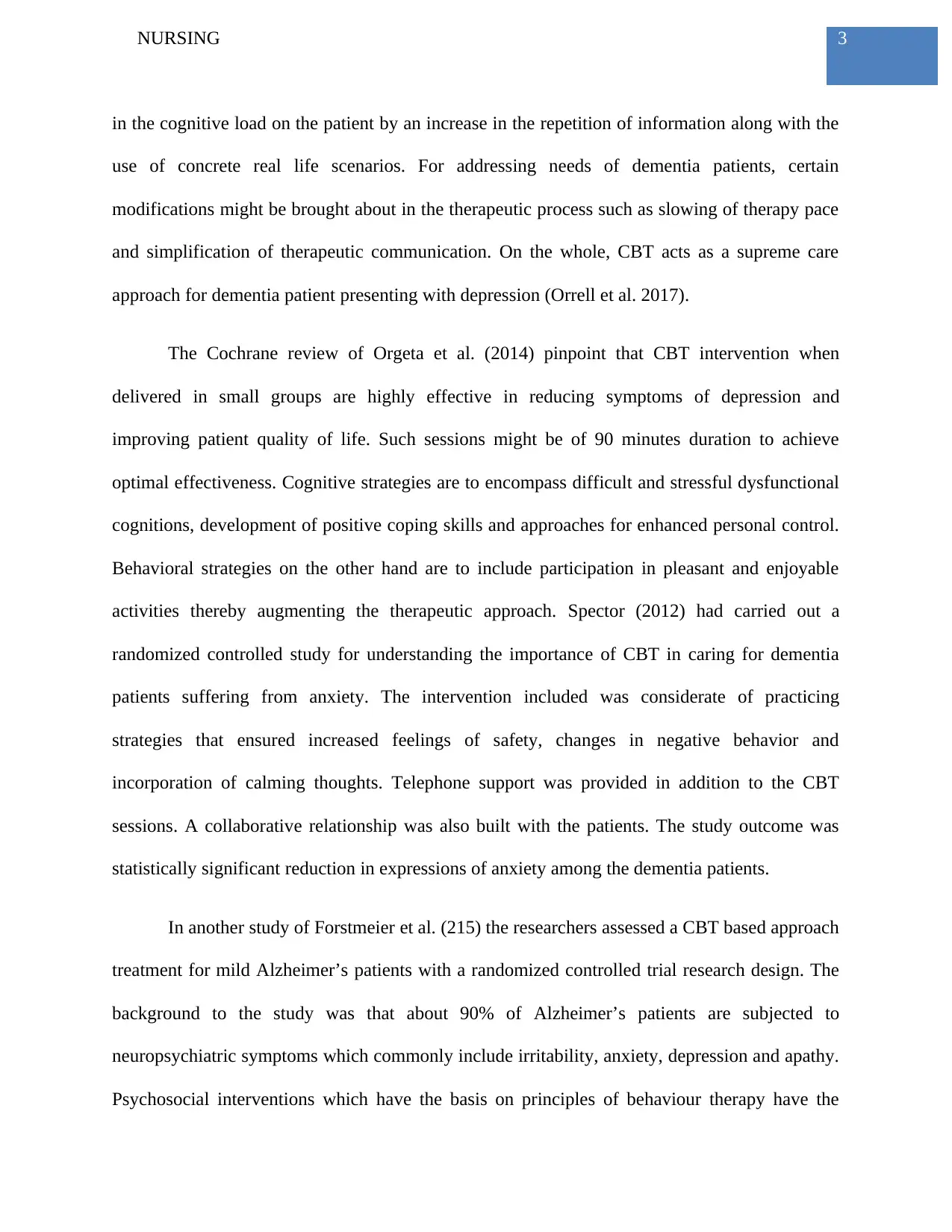
3NURSING
in the cognitive load on the patient by an increase in the repetition of information along with the
use of concrete real life scenarios. For addressing needs of dementia patients, certain
modifications might be brought about in the therapeutic process such as slowing of therapy pace
and simplification of therapeutic communication. On the whole, CBT acts as a supreme care
approach for dementia patient presenting with depression (Orrell et al. 2017).
The Cochrane review of Orgeta et al. (2014) pinpoint that CBT intervention when
delivered in small groups are highly effective in reducing symptoms of depression and
improving patient quality of life. Such sessions might be of 90 minutes duration to achieve
optimal effectiveness. Cognitive strategies are to encompass difficult and stressful dysfunctional
cognitions, development of positive coping skills and approaches for enhanced personal control.
Behavioral strategies on the other hand are to include participation in pleasant and enjoyable
activities thereby augmenting the therapeutic approach. Spector (2012) had carried out a
randomized controlled study for understanding the importance of CBT in caring for dementia
patients suffering from anxiety. The intervention included was considerate of practicing
strategies that ensured increased feelings of safety, changes in negative behavior and
incorporation of calming thoughts. Telephone support was provided in addition to the CBT
sessions. A collaborative relationship was also built with the patients. The study outcome was
statistically significant reduction in expressions of anxiety among the dementia patients.
In another study of Forstmeier et al. (215) the researchers assessed a CBT based approach
treatment for mild Alzheimer’s patients with a randomized controlled trial research design. The
background to the study was that about 90% of Alzheimer’s patients are subjected to
neuropsychiatric symptoms which commonly include irritability, anxiety, depression and apathy.
Psychosocial interventions which have the basis on principles of behaviour therapy have the
in the cognitive load on the patient by an increase in the repetition of information along with the
use of concrete real life scenarios. For addressing needs of dementia patients, certain
modifications might be brought about in the therapeutic process such as slowing of therapy pace
and simplification of therapeutic communication. On the whole, CBT acts as a supreme care
approach for dementia patient presenting with depression (Orrell et al. 2017).
The Cochrane review of Orgeta et al. (2014) pinpoint that CBT intervention when
delivered in small groups are highly effective in reducing symptoms of depression and
improving patient quality of life. Such sessions might be of 90 minutes duration to achieve
optimal effectiveness. Cognitive strategies are to encompass difficult and stressful dysfunctional
cognitions, development of positive coping skills and approaches for enhanced personal control.
Behavioral strategies on the other hand are to include participation in pleasant and enjoyable
activities thereby augmenting the therapeutic approach. Spector (2012) had carried out a
randomized controlled study for understanding the importance of CBT in caring for dementia
patients suffering from anxiety. The intervention included was considerate of practicing
strategies that ensured increased feelings of safety, changes in negative behavior and
incorporation of calming thoughts. Telephone support was provided in addition to the CBT
sessions. A collaborative relationship was also built with the patients. The study outcome was
statistically significant reduction in expressions of anxiety among the dementia patients.
In another study of Forstmeier et al. (215) the researchers assessed a CBT based approach
treatment for mild Alzheimer’s patients with a randomized controlled trial research design. The
background to the study was that about 90% of Alzheimer’s patients are subjected to
neuropsychiatric symptoms which commonly include irritability, anxiety, depression and apathy.
Psychosocial interventions which have the basis on principles of behaviour therapy have the
Paraphrase This Document
Need a fresh take? Get an instant paraphrase of this document with our AI Paraphraser
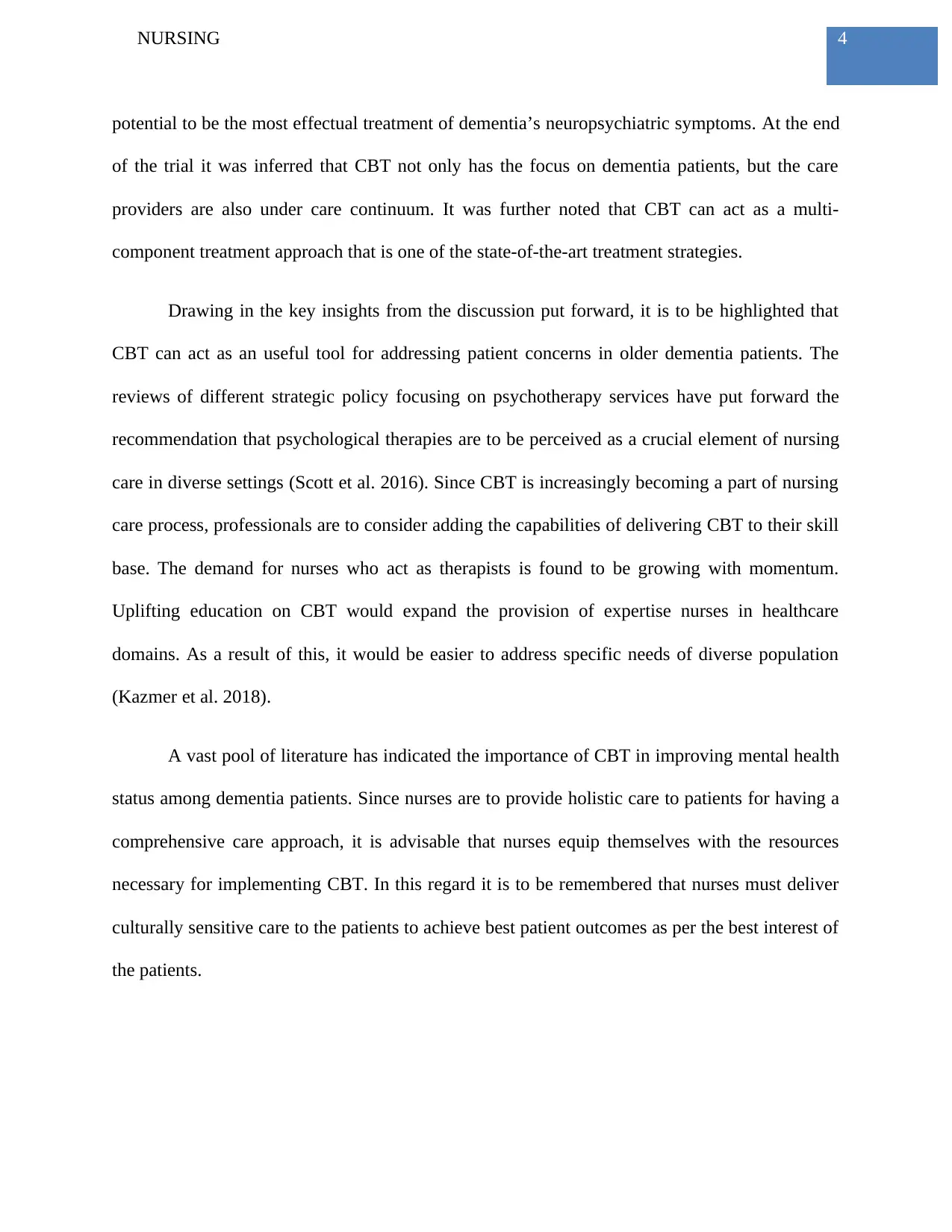
4NURSING
potential to be the most effectual treatment of dementia’s neuropsychiatric symptoms. At the end
of the trial it was inferred that CBT not only has the focus on dementia patients, but the care
providers are also under care continuum. It was further noted that CBT can act as a multi-
component treatment approach that is one of the state-of-the-art treatment strategies.
Drawing in the key insights from the discussion put forward, it is to be highlighted that
CBT can act as an useful tool for addressing patient concerns in older dementia patients. The
reviews of different strategic policy focusing on psychotherapy services have put forward the
recommendation that psychological therapies are to be perceived as a crucial element of nursing
care in diverse settings (Scott et al. 2016). Since CBT is increasingly becoming a part of nursing
care process, professionals are to consider adding the capabilities of delivering CBT to their skill
base. The demand for nurses who act as therapists is found to be growing with momentum.
Uplifting education on CBT would expand the provision of expertise nurses in healthcare
domains. As a result of this, it would be easier to address specific needs of diverse population
(Kazmer et al. 2018).
A vast pool of literature has indicated the importance of CBT in improving mental health
status among dementia patients. Since nurses are to provide holistic care to patients for having a
comprehensive care approach, it is advisable that nurses equip themselves with the resources
necessary for implementing CBT. In this regard it is to be remembered that nurses must deliver
culturally sensitive care to the patients to achieve best patient outcomes as per the best interest of
the patients.
potential to be the most effectual treatment of dementia’s neuropsychiatric symptoms. At the end
of the trial it was inferred that CBT not only has the focus on dementia patients, but the care
providers are also under care continuum. It was further noted that CBT can act as a multi-
component treatment approach that is one of the state-of-the-art treatment strategies.
Drawing in the key insights from the discussion put forward, it is to be highlighted that
CBT can act as an useful tool for addressing patient concerns in older dementia patients. The
reviews of different strategic policy focusing on psychotherapy services have put forward the
recommendation that psychological therapies are to be perceived as a crucial element of nursing
care in diverse settings (Scott et al. 2016). Since CBT is increasingly becoming a part of nursing
care process, professionals are to consider adding the capabilities of delivering CBT to their skill
base. The demand for nurses who act as therapists is found to be growing with momentum.
Uplifting education on CBT would expand the provision of expertise nurses in healthcare
domains. As a result of this, it would be easier to address specific needs of diverse population
(Kazmer et al. 2018).
A vast pool of literature has indicated the importance of CBT in improving mental health
status among dementia patients. Since nurses are to provide holistic care to patients for having a
comprehensive care approach, it is advisable that nurses equip themselves with the resources
necessary for implementing CBT. In this regard it is to be remembered that nurses must deliver
culturally sensitive care to the patients to achieve best patient outcomes as per the best interest of
the patients.
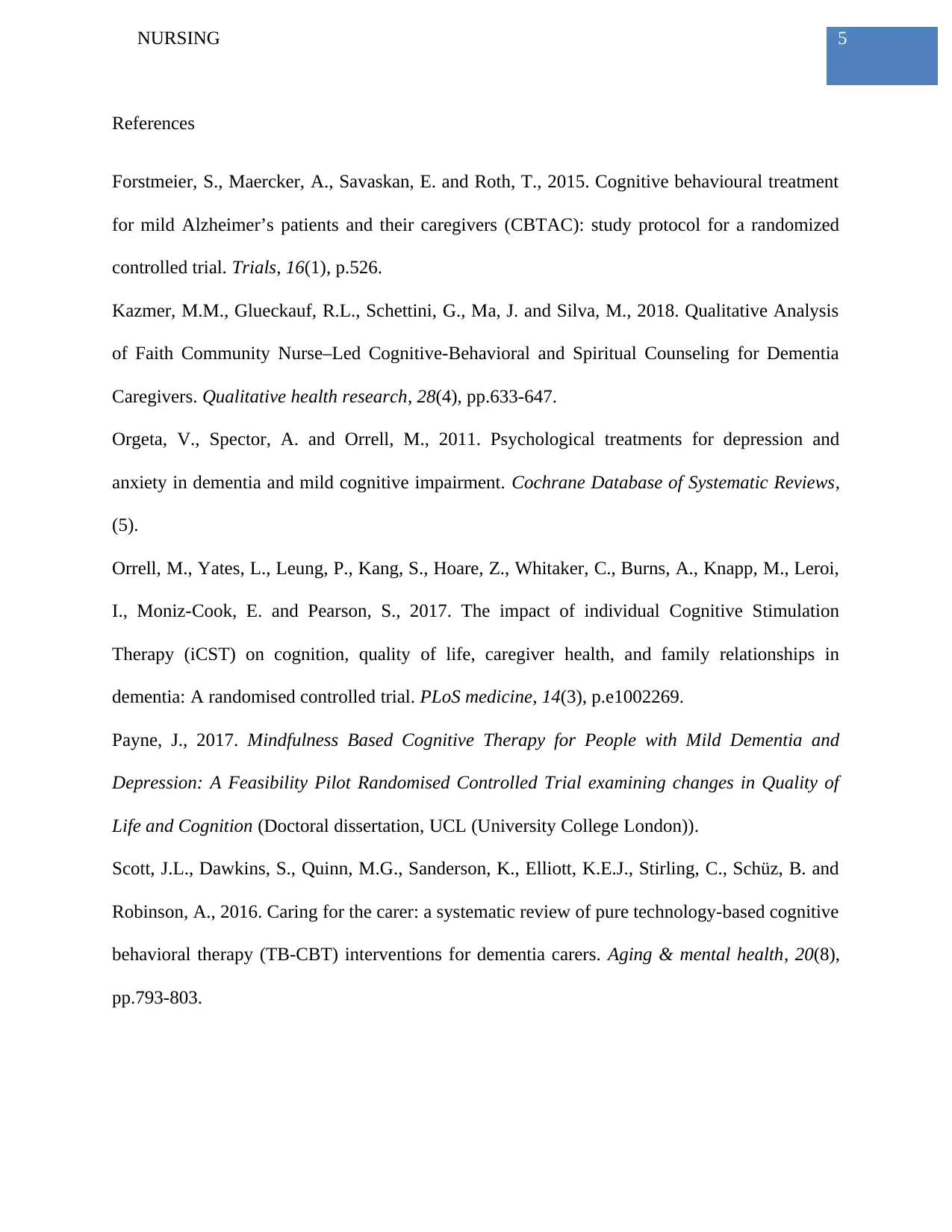
5NURSING
References
Forstmeier, S., Maercker, A., Savaskan, E. and Roth, T., 2015. Cognitive behavioural treatment
for mild Alzheimer’s patients and their caregivers (CBTAC): study protocol for a randomized
controlled trial. Trials, 16(1), p.526.
Kazmer, M.M., Glueckauf, R.L., Schettini, G., Ma, J. and Silva, M., 2018. Qualitative Analysis
of Faith Community Nurse–Led Cognitive-Behavioral and Spiritual Counseling for Dementia
Caregivers. Qualitative health research, 28(4), pp.633-647.
Orgeta, V., Spector, A. and Orrell, M., 2011. Psychological treatments for depression and
anxiety in dementia and mild cognitive impairment. Cochrane Database of Systematic Reviews,
(5).
Orrell, M., Yates, L., Leung, P., Kang, S., Hoare, Z., Whitaker, C., Burns, A., Knapp, M., Leroi,
I., Moniz-Cook, E. and Pearson, S., 2017. The impact of individual Cognitive Stimulation
Therapy (iCST) on cognition, quality of life, caregiver health, and family relationships in
dementia: A randomised controlled trial. PLoS medicine, 14(3), p.e1002269.
Payne, J., 2017. Mindfulness Based Cognitive Therapy for People with Mild Dementia and
Depression: A Feasibility Pilot Randomised Controlled Trial examining changes in Quality of
Life and Cognition (Doctoral dissertation, UCL (University College London)).
Scott, J.L., Dawkins, S., Quinn, M.G., Sanderson, K., Elliott, K.E.J., Stirling, C., Schüz, B. and
Robinson, A., 2016. Caring for the carer: a systematic review of pure technology-based cognitive
behavioral therapy (TB-CBT) interventions for dementia carers. Aging & mental health, 20(8),
pp.793-803.
References
Forstmeier, S., Maercker, A., Savaskan, E. and Roth, T., 2015. Cognitive behavioural treatment
for mild Alzheimer’s patients and their caregivers (CBTAC): study protocol for a randomized
controlled trial. Trials, 16(1), p.526.
Kazmer, M.M., Glueckauf, R.L., Schettini, G., Ma, J. and Silva, M., 2018. Qualitative Analysis
of Faith Community Nurse–Led Cognitive-Behavioral and Spiritual Counseling for Dementia
Caregivers. Qualitative health research, 28(4), pp.633-647.
Orgeta, V., Spector, A. and Orrell, M., 2011. Psychological treatments for depression and
anxiety in dementia and mild cognitive impairment. Cochrane Database of Systematic Reviews,
(5).
Orrell, M., Yates, L., Leung, P., Kang, S., Hoare, Z., Whitaker, C., Burns, A., Knapp, M., Leroi,
I., Moniz-Cook, E. and Pearson, S., 2017. The impact of individual Cognitive Stimulation
Therapy (iCST) on cognition, quality of life, caregiver health, and family relationships in
dementia: A randomised controlled trial. PLoS medicine, 14(3), p.e1002269.
Payne, J., 2017. Mindfulness Based Cognitive Therapy for People with Mild Dementia and
Depression: A Feasibility Pilot Randomised Controlled Trial examining changes in Quality of
Life and Cognition (Doctoral dissertation, UCL (University College London)).
Scott, J.L., Dawkins, S., Quinn, M.G., Sanderson, K., Elliott, K.E.J., Stirling, C., Schüz, B. and
Robinson, A., 2016. Caring for the carer: a systematic review of pure technology-based cognitive
behavioral therapy (TB-CBT) interventions for dementia carers. Aging & mental health, 20(8),
pp.793-803.
⊘ This is a preview!⊘
Do you want full access?
Subscribe today to unlock all pages.

Trusted by 1+ million students worldwide
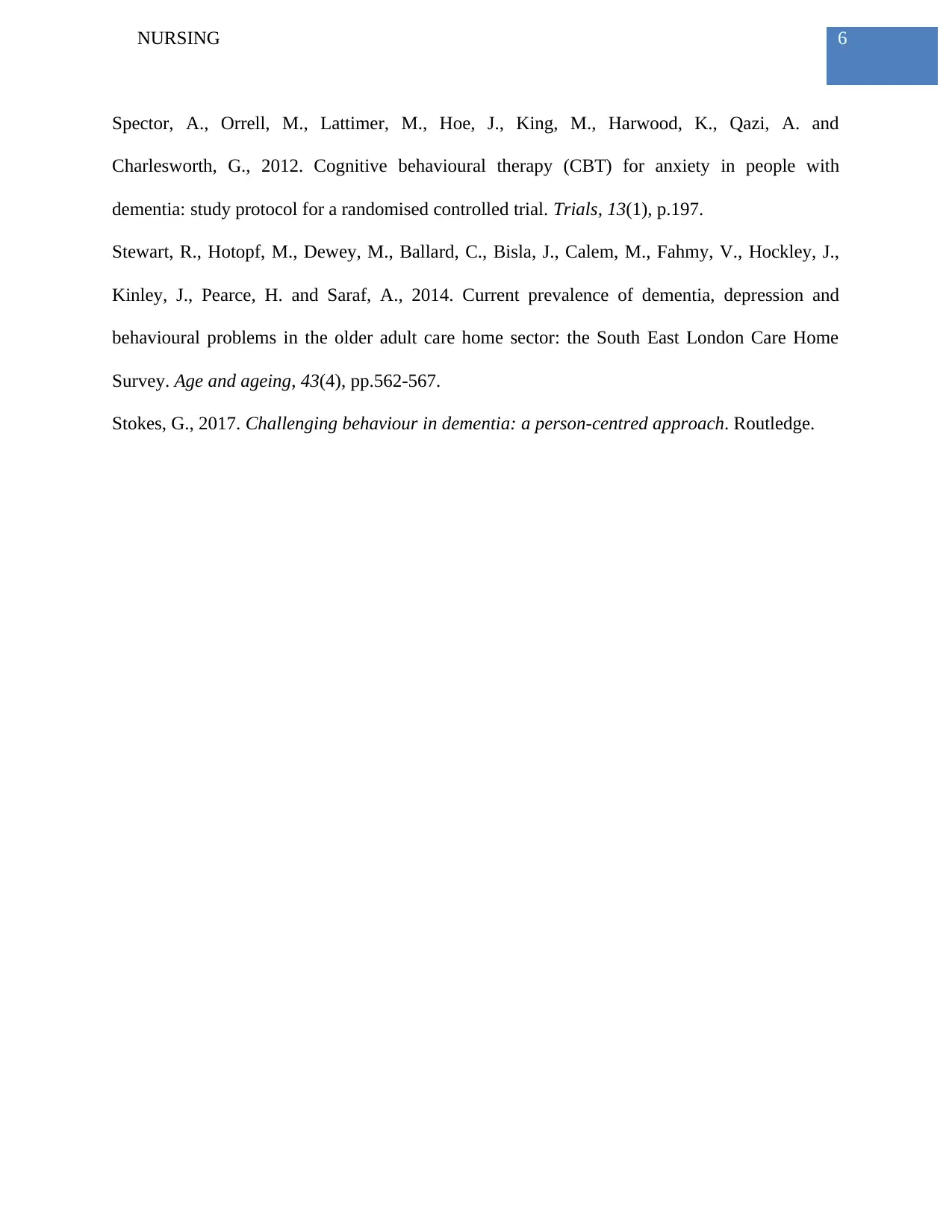
6NURSING
Spector, A., Orrell, M., Lattimer, M., Hoe, J., King, M., Harwood, K., Qazi, A. and
Charlesworth, G., 2012. Cognitive behavioural therapy (CBT) for anxiety in people with
dementia: study protocol for a randomised controlled trial. Trials, 13(1), p.197.
Stewart, R., Hotopf, M., Dewey, M., Ballard, C., Bisla, J., Calem, M., Fahmy, V., Hockley, J.,
Kinley, J., Pearce, H. and Saraf, A., 2014. Current prevalence of dementia, depression and
behavioural problems in the older adult care home sector: the South East London Care Home
Survey. Age and ageing, 43(4), pp.562-567.
Stokes, G., 2017. Challenging behaviour in dementia: a person-centred approach. Routledge.
Spector, A., Orrell, M., Lattimer, M., Hoe, J., King, M., Harwood, K., Qazi, A. and
Charlesworth, G., 2012. Cognitive behavioural therapy (CBT) for anxiety in people with
dementia: study protocol for a randomised controlled trial. Trials, 13(1), p.197.
Stewart, R., Hotopf, M., Dewey, M., Ballard, C., Bisla, J., Calem, M., Fahmy, V., Hockley, J.,
Kinley, J., Pearce, H. and Saraf, A., 2014. Current prevalence of dementia, depression and
behavioural problems in the older adult care home sector: the South East London Care Home
Survey. Age and ageing, 43(4), pp.562-567.
Stokes, G., 2017. Challenging behaviour in dementia: a person-centred approach. Routledge.
1 out of 7
Related Documents
Your All-in-One AI-Powered Toolkit for Academic Success.
+13062052269
info@desklib.com
Available 24*7 on WhatsApp / Email
![[object Object]](/_next/static/media/star-bottom.7253800d.svg)
Unlock your academic potential
Copyright © 2020–2026 A2Z Services. All Rights Reserved. Developed and managed by ZUCOL.




